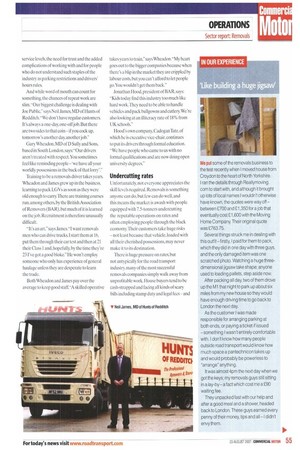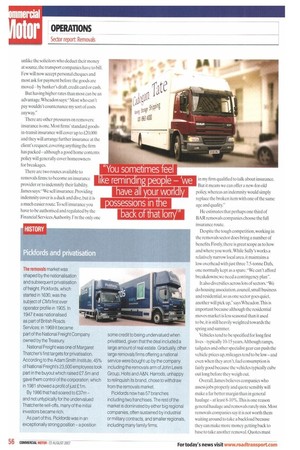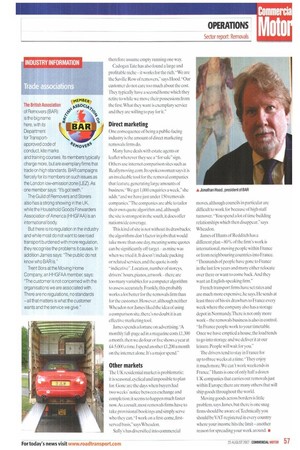IN OUR EXPERIENCE
Page 55

Page 56

Page 57

If you've noticed an error in this article please click here to report it so we can fix it.
'Like building a huge jigsaw'
We put some of the removals business to
the test recently when I moved house from Croydon to the heart of North Yorkshire.
I ran the details through Reallymoving.
corn to start with, and although it brought up lots of local names I wouldn't otherwise
have known, the quotes were way off—
between £700 and 21,350 for a job that eventually cost 21,600 with the Moving Home Company. Their original quote was 2763.75.
Several things struck me in dealing with this outfit—firstly, I paid for them to pack, which they did in one day with three guys, and the only damaged item was one scratched photo. Watching a huge three dimensional jigsaw take shape; anyone used to loading pallets, step aside now.
After packing all day, two of them drove up the M1 that night to park up about six miles from my new house so they would have enough driving time to go back to London the next day.
As the customer I was made responsible for arranging parking at both ends, or paying a ticket if issued —something I wasn't entirely comfortable
with. i don't know how many people
outside road transport would know how much space a pantechnicon takes up and would probably be powerless to "arrange" anything.
It was almost 4pm the next day when we got the keys; my removals guys still sitting in a lay-by —a fact which cost me a 290 waiting fee.
They unpacked fast with our help and after a good meal and a shower, headed back to London. These guys earned every penny of their money, tips and all — I didn't envy them. unlike the solicitors who deduct their money at source, the transport companies have to bill. Few will now accept personal cheques and most ask for payment before the goods are moved-by banker's draft, credit card or cash.
But having higher rates than most can be an advantage. Wheadon says: "Most who can't pay wouldn't countenance my sort of costs anyway."
There are other pressures on removers: insurance is one. Most firms' standard goodsin-transit insurance will cover up to £20,000 and they will arrange further insurance at the client's request, covering anything the firm has packed-although a good home contents policy will generally cover homeowners for breakages.
There are two routes available to removals firms: to become an insurance provider or to indemnify their liability. James says:"We sell insurance. Providing indemnity cover is a duck and dive, but it is a much easier route.To sell insurance you have to be authorised and regulated by the Financial Services Authority. I'm the only one in my firm qualified to talk about insurance. But it means we can offer a new-for-old policy, whereas an indemnity would simply replace the broken item with one of the same age and quality."
He estimates that perhaps one third of BAR removals companies choose the full insurance route.
Despite the tough competition, working in the removals sector does bring a number of benefits. Firstly, there is great scope as to how and where you work. While Sully's works a relatively narrow local area, it maintains a low overhead with just three 7.5-tonne Dafs, one normally kept as a spare. "We can't afford breakdowns; we need a contingency plan".
It also diversifies across lots of sectors, "We do housing association, council,small business and residential, so as one sector goes quiet, another will pick up," says Wheadon.This is important because although the residential moves market is less seasonal than it used to be, it is still heavily weighted towards the spring and summer.
Vehicles tend to be specified for long first livestypically 10-15 years. Although ramps, tailgates and other specialist gear can push the vehicle prices up, mileages tend to be low -and even when they aren't, fuel consumption is fairly good because the vehicles typically cube out long before they weigh out.
Overall,James believes companies who assess jobs properly and quote sensibly will make a far better margin than in general haulageat least 8-10% This is one reason general haulage and removals rarely mix. Most removals companies say it is not worth them waiting around to take a backload because they can make more money getting back to base to take another removal. Quotes must therefore assume empty running one way.
Cadogan Tate has also found a large and profitable niche it works for the rich. "We are the Saville Row of removers," says Hood."Our customer do not care Lou much about the cost. They typically have a second home which they retire to while we move their possessions from the lirst.What they want is exemplary service and they are willing to pay for it."
Direct marketing
One consequence of being a public-facing industry is the amount of direct marketing removals firms do.
Many have deals with estate agents or leaflet wherever they see a "for sale" sign. Others use internet comparison sites such as Reallymoving.com. Its spokeswoman says it is an invaluable tool for the removal companies that feature, generating large amounts of business."We get 1,000 enquiries a week," she adds,"and we have just under 150 removals companies."The companies are able to tailor their own quote algorithm and, although the site is strongest in the south, it does offer nationwide coverage.
This kind of site is not without its drawbacks; the algorithms don't factor in jobs that would take more than one day, meaning some quotes can he significantly off target—as mine was when we tried it. It doesn't include packing or related services, and the quote is only "indicative". Location, number of storeys, drivers' hours, pianos, artwork — there are too many variables for a computer algorithm to assess accurately. Frankly, this probably works a lot better for the removals firm than for the customer. However, although neither Wheadon nor James liked the idea of using a comparison site, there's no doubt it is an effective marketing tool.
James spends a fortune on advertising. 'A monthly full-page ad in a magazine costs £1.300 a month, then we do four or live shows a year at £4-5.000 a time. [ spend another £1,200 a month on the internet alone. It's a major spend."
Other markets
The UK residential market is problematic; it is seasonal, cyclical and impossible to plan for. Gone are the days when buyers had two weeks' notice between excha n.ge and completion; it seems to happen much faster now. As a result, most removals firms have to take provisional bookings and simply serve who they can."I work on a first-come, firstserved basis," says Wheadon.
Sully's has diversified into commercial moves, although councils in particular are difficult to work for because of high staff turnover. You spend a lot of time building relationships which then disappear," says Wheadon.
James of Hunts of Redditch has a different plan — 80% of the firm's work is international, moving people within France or from neighbouring countries into France. "Thousands of people have gone to France in the last few years and many either relocate over there or want to come hack. And they want an English-speaking firm."
French transport firms have set rates and are much more expensive, he says. He sends at least three of his six drawbars to France every week where the company also has a storage depot in Normandy.There is not only more work— the removals business is also in control. "In France people work to your timetable. Once we have emptied a house, the load tends to go into storage and we deliver it at our leisure. People will wait for you."
The drivers tend to stay in France for up to three weeks at a time."They enjoy it much more. We can't work weekends in France." Hunts is one of only half a dozen UK companies that carries out removals just within Europe; there are many others that will ship goods throughout the world.
Moving goods across borders is little problem, says James, but there is one snag firms should be aware oil Technically you should be VAT-registered in every country where your income hits the limit —another reason for spreading your work around. •
























































































































































































